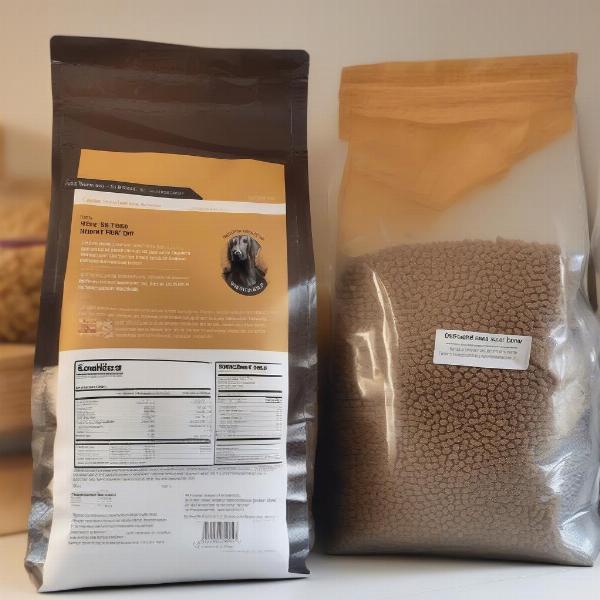White dog dog food isn’t a specific brand, but rather a descriptor that can apply to many different dog food formulas. This guide will explore various aspects of choosing the right diet for white-coated dogs, addressing common concerns and offering practical advice for both new and experienced owners. We’ll cover everything from breed-specific needs to potential food staining issues and how to select a nutritious and palatable food for your furry friend.
Understanding Your White Dog’s Nutritional Needs
Just like humans, dogs require a balanced diet to thrive. For white-coated dogs, choosing the right food can be particularly important, not only for their overall health but also for maintaining their pristine coat. While “white dog dog food” isn’t a distinct category, certain ingredients can contribute to a healthier, brighter white coat. Factors like breed, age, activity level, and any existing health conditions all play a role in determining the ideal diet.
Breed-Specific Considerations for White Dogs
Certain white-coated breeds, such as West Highland White Terriers or Bichon Frises, may be prone to specific skin sensitivities. Opting for hypoallergenic or limited ingredient diets can help minimize potential allergic reactions and keep their skin and coat healthy.
Addressing Tear Staining in White Dogs
One of the most common concerns for owners of white dogs is tear staining. While not directly related to the color of their food, certain ingredients can exacerbate this issue. Avoiding foods high in artificial colors and preservatives may help reduce tear staining.
Choosing the Right White Dog Dog Food
With countless dog food options available, navigating the market can feel overwhelming. Look for foods that are rich in high-quality protein sources, healthy fats, and essential vitamins and minerals. Avoid fillers, artificial ingredients, and by-products.
Dry vs. Wet Food for White Dogs
Both dry and wet food have their advantages and disadvantages. Dry food is typically more affordable and convenient, while wet food can be more palatable for picky eaters. Choosing the best option depends on your dog’s individual preferences and needs.
Grain-Free vs. Grain-Inclusive Diets
The debate surrounding grain-free diets continues. While some dogs may benefit from a grain-free diet due to allergies or sensitivities, others thrive on grain-inclusive formulas. Consult with your veterinarian to determine the best approach for your white dog.
 Comparing Dog Food Ingredients
Comparing Dog Food Ingredients
Maintaining a Healthy White Coat
Beyond choosing the right food, other factors can impact your white dog’s coat health. Regular grooming, including brushing and bathing, is essential.
Grooming Tips for White-Coated Dogs
Using a shampoo specifically formulated for white coats can help enhance their brightness and prevent discoloration. Regular brushing helps remove dirt and debris, preventing it from dulling the coat.
Addressing Skin Allergies and Sensitivities
If your white dog experiences skin allergies or sensitivities, consult with your veterinarian. They can help identify potential allergens and recommend appropriate dietary changes or other treatments.
Conclusion
Choosing the best “white dog dog food” really comes down to selecting a high-quality, nutritious diet tailored to your dog’s individual needs. By considering factors such as breed, age, activity level, and potential allergies, you can help your white-coated companion maintain a healthy, vibrant coat and overall well-being. Remember to consult with your veterinarian for personalized recommendations.
FAQ
- Does white dog food exist? No, “white dog dog food” isn’t a specific category. It refers to choosing the best food for a white-coated dog.
- What causes tear stains in white dogs? Several factors can contribute to tear staining, including genetics, allergies, and diet.
- How can I prevent my white dog’s coat from getting stained? Regular grooming and choosing a diet free of artificial colors and preservatives can help.
- Is grain-free food better for white dogs? Not necessarily. The best diet depends on your dog’s individual needs and any existing allergies or sensitivities.
- What should I look for in a high-quality dog food? Look for high-quality protein sources, healthy fats, and essential vitamins and minerals. Avoid fillers and artificial ingredients.
- How often should I groom my white dog? Regular brushing and bathing are essential. The frequency depends on your dog’s breed and coat type.
- What should I do if my white dog has skin allergies? Consult with your veterinarian to identify potential allergens and develop a treatment plan.
ILM Dog is a leading international online resource for dog owners, providing expert advice on dog breeds, health, training, nutrition, grooming, and more. We are dedicated to helping you provide the best possible care for your canine companion. From choosing the perfect dog harness with handle for large dogs to understanding the nuances of different breeds, we offer comprehensive, reliable information. For personalized guidance on your dog’s nutritional needs, or to explore a range of high-quality dog products and accessories, contact us at [email protected] or call us at +44 20-3965-8624. ILM Dog is your trusted partner in responsible dog ownership.